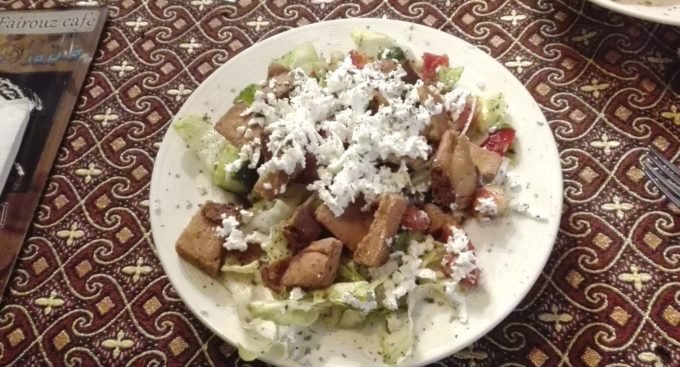
Everybody Loves Fairuz

Everybody Loves Fairuz
Fattoush in Tel Aviv
Walking around Old Jaffa—Tel Aviv’s southernmost suburb—one morning, I stumbled upon Fairuz’s distinctive likeness (her elegant nose and heavy eyeliner) in a rather unexpected place: a café in Israel.
Lebanese singer Fairuz is one of the most influential and beloved Arabic-speaking singers of the 20th century. Her songs—touching on romance and a love of Lebanon—are a constant soundtrack in bars and cafés from Morocco to Jordan.
Inside Café Fairouz, the walls were adorned with Fairuz murals. Arab restaurants, and images of popular Arab singers, are not an unusual sight in Jaffa, which is considered by locals a successful example of coexistence, where Palestinians and liberal Jews live side-by-side. Still, I have found that places that reference Lebanon specifically are less common.
Although the two countries never shared conventional diplomatic relations, their relationship reached new lows during (and since) the 1982 Lebanon war, when Israel invaded the south of the country to attack the Palestinian Liberation Organization (PLO) bases there. Lebanon still remains technically at war with Israel, and Israel still identifies Lebanon as an enemy state because of threats to it from Hezbollah.
I sat down next to Fairuz’s name spelled in Hebrew characters and a large image of a cedar tree. It made me think of the lyrics to her song “Li Beirut”, taking me back to 2014, when I lived in Lebanon as an exchange student.
The menu is self-consciously Lebanese. From grilled halloumi to a dessert called Layale Lebnan, it’s a love letter to a country most Israelis can’t visit. (One can’t enter Lebanon with an Israeli passport or with stamps from a previous visit to Israel—although some have found ways around this.) The cafe was opened in January 2017, and the staff are Palestinians from Jaffa who feel integrated and speak Arabic and Hebrew. They chose to theme the café for Fairuz because she’s a beloved figure for Arabs across the world, and everyone they know enjoys her music.
I settled on ordering the fattoush—like tabbouleh, a well-known Lebanese salad. Made with lettuce, onion, cucumbers, tomatoes, mint and parsley, and often with sumac, a distinctive sour spice, as well as bread—fresh, toasted, or fried. I hadn’t had the dish since I left Lebanon.
As I ate, I started comparing my experiences in Lebanon and Israel, where I spent the summer on a reporting fellowship. I noticed some small, but hopeful, signs of change. Many Israelis I met listen to Mashrou’ Leila—a Lebanese rock band—and think it’s a pity they can’t visit the beautiful Roman temples of Baalbek in Lebanon. I hoped the two countries could find common ground in the future, perhaps starting with food and music—like at this café.
Fairouz Cafe
1, Louis Pasteur St 5
Tel Aviv-Yafo
Up Next
Land of Pork and Honey
A Traveler’s Toast to Dead, Drunk Men
A clear alcohol made from the grape skins and stems leftover from winemaking, chacha is the Republic of Georgia’s version of grappa.
Blood Moon Rising
The High Holy Days, apocalyptic portents, and civil unrest: just another trip to the Holy Land.
Lessons from a Team Retreat
What did the extended Roads & Kingdoms family learn in the hills of Emilia-Romagna? Let’s start with these eight simple rules for travel.
Afro‑Cuban artist, cook, and queer activist Nancy Cepero on questioning everything
Nancy Cepero, vegan chef, queer anti-racist activist and artist, on trying to change Cuba’s food culture, self-care, and queer activism after the backlash against same-sex marriage.






